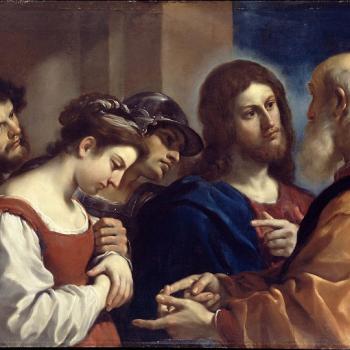But it is objected that the people of America may, perhaps, choose representatives who have no religion at all, and that pagans and Mahometans may be admitted into offices. But how is it possible to exclude any set of men, without taking away that principle of religious freedom which we ourselves so warmly contend for? This is the foundation on which persecution has been raised in every part of the world. . . . If you admit the least difference, the door to persecution is opened. . . . It would be happy for mankind if religion was permitted to take its own course, and maintain itself by the excellence of its own doctrines.
These examples clearly make the case that being a good citizen was independent in the Founders' eyes from whatever religion a person might have.
Historians would probably agree that if any single person can be said to have a definitive view about the constitution's meaning, James Madison would be their choice. He was the principle author of the Federalist Papers, which made the most definitive case for its adoption. His notes are the only record we have of the Constitutional Convention. In addition, Madison was responsible for introducing the first ten amendments to the constitution and getting them through Congress, the amendments later called the "Bill of Rights." Madison was not just "any" Founder.
Madison observed that dominant political factions' misuse of power in the past had led to the destruction of many Classical democracies, resulting in civil war and ultimately tyranny. The traditional solution to this fatal dynamic had been to create a uniformity of interest that would prevent factions, but in practice this goal had proven unattainable. Madison saw that when people were free to think for themselves, they inevitably developed a diversity of views, whether in religious or political opinions. Diversity was a feature, not a flaw of a free society.
In 1785, Madison wrote that "torrents of blood have been spilt in the world in vain attempts of the secular arm to extinguish religious discord, by proscribing all differences in religious opinion." The same would happen in America if government sought to create religious uniformity. But harmony could be established by other means. He wrote in Federalist 10:
In a free government, the security for civil rights must be the same as that for religious rights. It consists in the one case in the multiplicity of interests, and in the other, the multiplicity of sects. Diversity could prevent any powerful single interest from being able to ride roughshod over the interests of others because no faction on its own could constitute a majority.
When wisely channeled, diversity can become a source of strength, not weakness.
In an 1822 letter to Edward Livingston, Madison summed up what he regarded as a defining requirement for preserving both political freedom and religious liberty:
An alliance or coalition between Government and religion cannot be too carefully guarded against. . . . Every new and successful example therefore of a perfect separation between ecclesiastical and civil matters is of importance . . . religion and government will exist in greater purity, without (rather) than with the aid of government.
Madison took this principle so seriously he even opposed Congress appointing a chaplain at taxpayers' expense. As he explained to Livingston: "It would have been a much better proof to their Constituents of their pious feeling if the members had contributed for the purpose, a pittance from their own pockets."
Madison's point is clear to all but Christianists and other bigots. Religious diversity aids in the preservation of a free society.
Madison, Jefferson, Washington, Adams and other Founders had considerable religious support for their efforts. For example, America's Baptists strongly supported Jefferson and Madison's successful efforts to establish the separation of church and state in Virginia. Today's degenerate Southern Baptist leadership repudiates their own history while remaining silent as to the reasons behind their ancestors' actions.
Did the Founders' Vision Succeed?
Our Founders' effort to create a space for religious expression free from political privilege was largely successful. Religion provided the moral energy to empower many of the finest reform movements in American history, including the abolition of slavery, abolishing child labor, women's suffrage, and the civil rights movement. Not all religiously inspired reforms were wise or successful. The folly of Prohibition comes to mind, as well as the contemporary battle over a woman's control of her body. There are no guarantees free citizens will always act wisely. But whether it be foolish or wise, in a free society religious diversity forces advocates of reform or the status quo to put their arguments in terms other Americans can accept.





